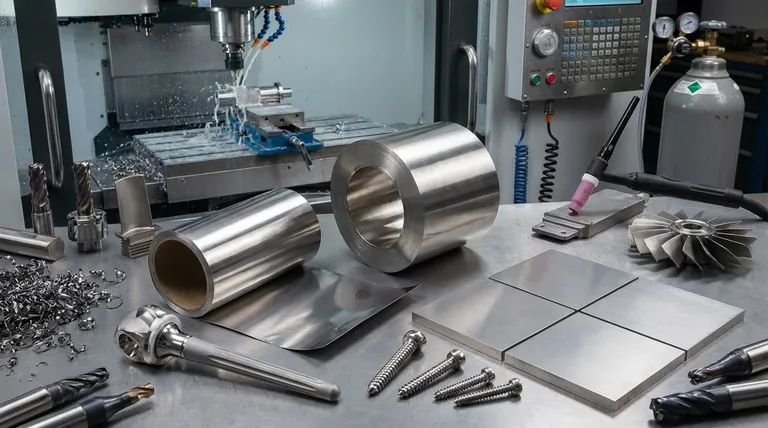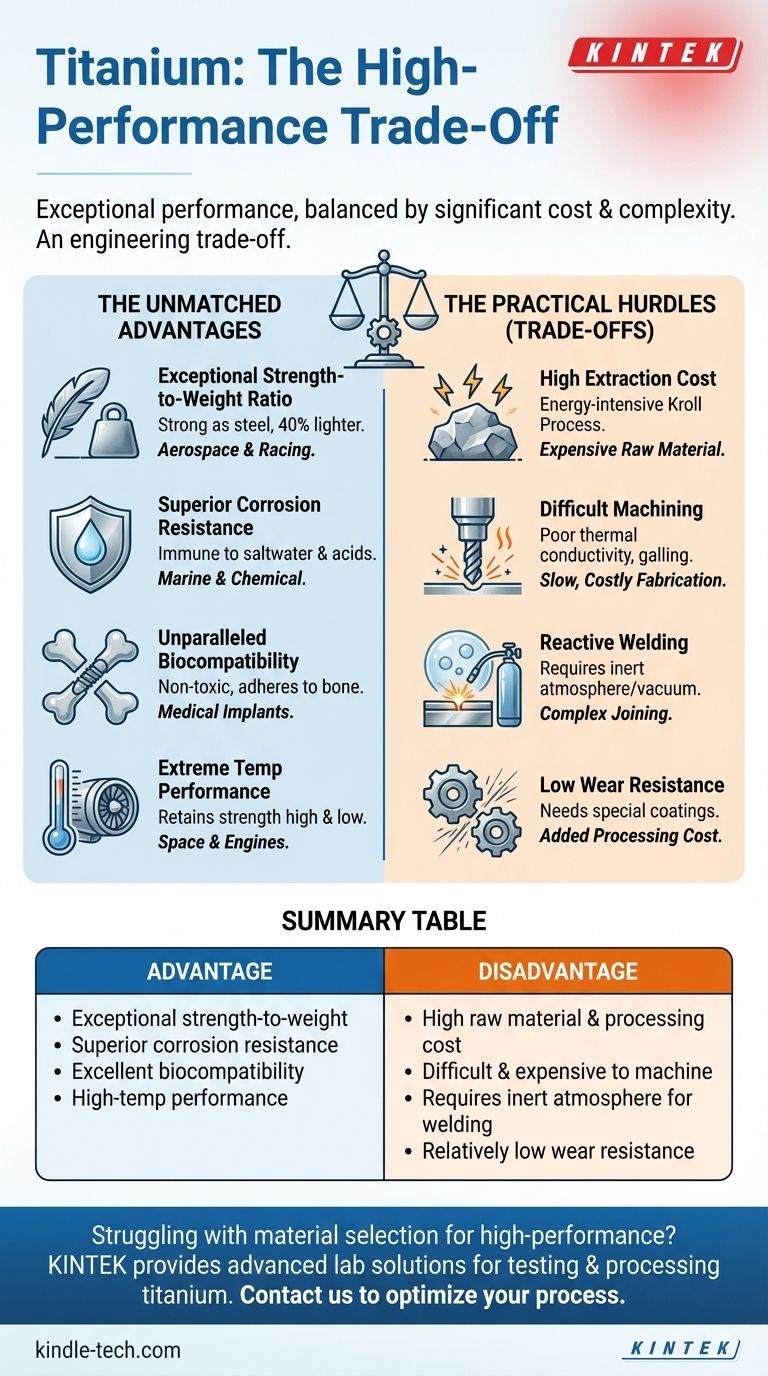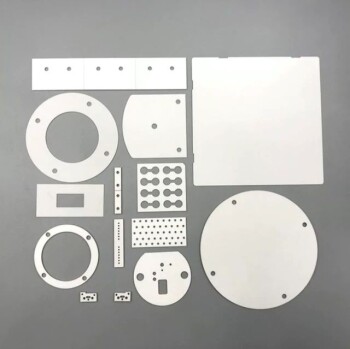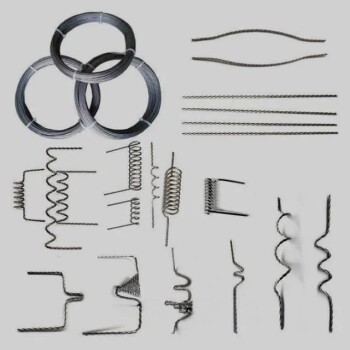From aerospace frames to medical implants, titanium is a material defined by its exceptional performance and equally significant cost. Its primary advantages are an incredibly high strength-to-weight ratio and outstanding corrosion resistance. However, these benefits are balanced by its main disadvantages: high raw material cost and the immense difficulty involved in machining and fabricating it.
The decision to use titanium is rarely a matter of simple preference; it is an engineering trade-off. You are choosing to accept its high cost and manufacturing complexity in exchange for performance characteristics that few other metals can provide.

The Unmatched Advantages of Titanium
Titanium’s benefits stem from its unique chemical and physical properties. When an application demands performance above all else, these attributes often justify the expense.
Exceptional Strength-to-Weight Ratio
Titanium alloys possess the highest strength-to-weight ratio of any metallic element. A component made from a common titanium alloy is as strong as many steels but at only 60% of the weight.
This property is the primary reason for its dominance in the aerospace industry, where reducing weight directly translates to increased payload capacity and fuel efficiency.
Superior Corrosion Resistance
Titanium naturally forms a very thin, stable, and highly adherent oxide layer on its surface. This passive film instantly reforms in the presence of oxygen, making the metal exceptionally resistant to corrosion.
It is virtually immune to attack from saltwater, chlorine solutions, and a wide range of industrial acids, which is why it's a go-to material for marine hardware, chemical processing plants, and desalination facilities.
Unparalleled Biocompatibility
Titanium is non-toxic and is not rejected by the human body, a property known as biocompatibility. The body's tissues can grow and adhere directly to titanium implants.
This makes it the gold standard for medical applications, including hip and knee replacements, dental implants, bone-fixing screws and plates, and pacemaker cases.
Performance at Temperature Extremes
With a melting point over 3,000°F (1,668°C), titanium alloys retain their strength far better at elevated temperatures than aluminum or magnesium alloys.
This high-temperature performance is critical for jet engine components and spacecraft heat shields. It also performs well at cryogenic temperatures, resisting the brittleness that affects many other metals.
Understanding the Trade-offs: The Practical Hurdles
While its advantages are clear, the practical challenges and costs associated with titanium are significant. These disadvantages are what confine it to high-performance, critical applications.
The High Cost of Extraction
Although titanium is the ninth most abundant element in the Earth's crust, it is not found in a pure state. The process of refining titanium ore into pure metal, known as the Kroll Process, is extremely energy-intensive and complex.
This multi-step batch process is the single biggest contributor to titanium's high raw material cost, which can be many times that of steel or aluminum.
Difficulties in Machining and Fabrication
Machining titanium is notoriously difficult. It has low thermal conductivity, meaning heat does not dissipate from the cutting tool, leading to premature tool wear. It is also prone to "galling," where it can weld itself to the cutting tool under pressure.
Fabrication requires specialized tools, low cutting speeds, high volumes of coolant, and experienced operators, all of which dramatically increase manufacturing costs and time compared to other metals.
Reactivity During Welding
While stable at room temperature, titanium becomes highly reactive with oxygen, nitrogen, and hydrogen at the elevated temperatures required for welding. Contamination from these elements can make the weld brittle and prone to failure.
As a result, welding titanium must be done in a controlled inert gas atmosphere (like argon) or a vacuum. This adds significant complexity, equipment cost, and time to the manufacturing process.
Relatively Low Wear Resistance
In its un-alloyed or untreated state, titanium has poor surface wear characteristics, especially in sliding applications against itself or other metals. It is susceptible to fretting and galling.
For applications involving moving parts, special coatings or surface treatments like nitriding or anodizing are often required to improve its surface hardness, adding yet another layer of cost and complexity.
Making the Right Choice for Your Application
Choosing a material is about matching its properties to your project's most critical requirements. Titanium is a specialist material, not a general-purpose solution.
- If your primary focus is absolute performance and weight reduction (e.g., aerospace, racing): The superior strength-to-weight ratio makes the high cost a necessary and justifiable investment.
- If your primary focus is biocompatibility and long-term stability in the body (e.g., medical): Titanium's inertness is a non-negotiable requirement, justifying its use over any other metal.
- If your primary focus is resistance to harsh chemical or marine environments: Its unparalleled corrosion resistance can lead to a lower total lifetime cost, despite a higher initial price tag.
- If your primary focus is cost-efficiency for a general-purpose application: A high-quality steel or aluminum alloy will almost always provide a more practical and economical solution.
Ultimately, understanding these fundamental trade-offs is the key to leveraging titanium's power without succumbing to its price.
Summary Table:
| Advantage | Disadvantage |
|---|---|
| Exceptional strength-to-weight ratio | High raw material and processing cost |
| Superior corrosion resistance | Difficult and expensive to machine |
| Excellent biocompatibility | Requires inert atmosphere for welding |
| High-temperature performance | Relatively low wear resistance |
Struggling to select the right material for your high-performance application? The experts at KINTEK are here to help. We specialize in providing the advanced lab equipment and consumables needed to test and process challenging materials like titanium. Our solutions support industries from aerospace to medical devices, ensuring you have the right tools for material analysis, fabrication, and quality control.
Contact KINTEK today to discuss how our expertise can help you optimize your material selection and manufacturing processes, balancing performance with practicality.
Visual Guide

Related Products
- High-Purity Titanium Foil and Sheet for Industrial Applications
- Custom-Made Alumina Zirconia Special-Shaped Ceramic Plates for Engineering Advanced Fine Ceramics Processing
- Thermally Evaporated Tungsten Wire for High Temperature Applications
People Also Ask
- What is the necessity of high-shear emulsifiers in silver nanoparticle coatings? Achieve Perfect Dispersion Today
- What is a braze repair process? A Low-Heat Solution for Strong, Seamless Metal Joining
- Why pyrolysis is better than incineration? Transforming Waste into Valuable Resources
- What are the applications of thin film? Powering Modern Electronics, Optics, and Energy
- What is the thermal property of graphite? Mastering Extreme Heat Management
- What is the purpose of reactive sputtering? Synthesize High-Performance Compound Thin Films
- What is the effect of sputtering pressure? Master Atomic Energy for Superior Thin Films
- How does physical vapour deposition work? A Guide to Atomic-Level Coating Technology


